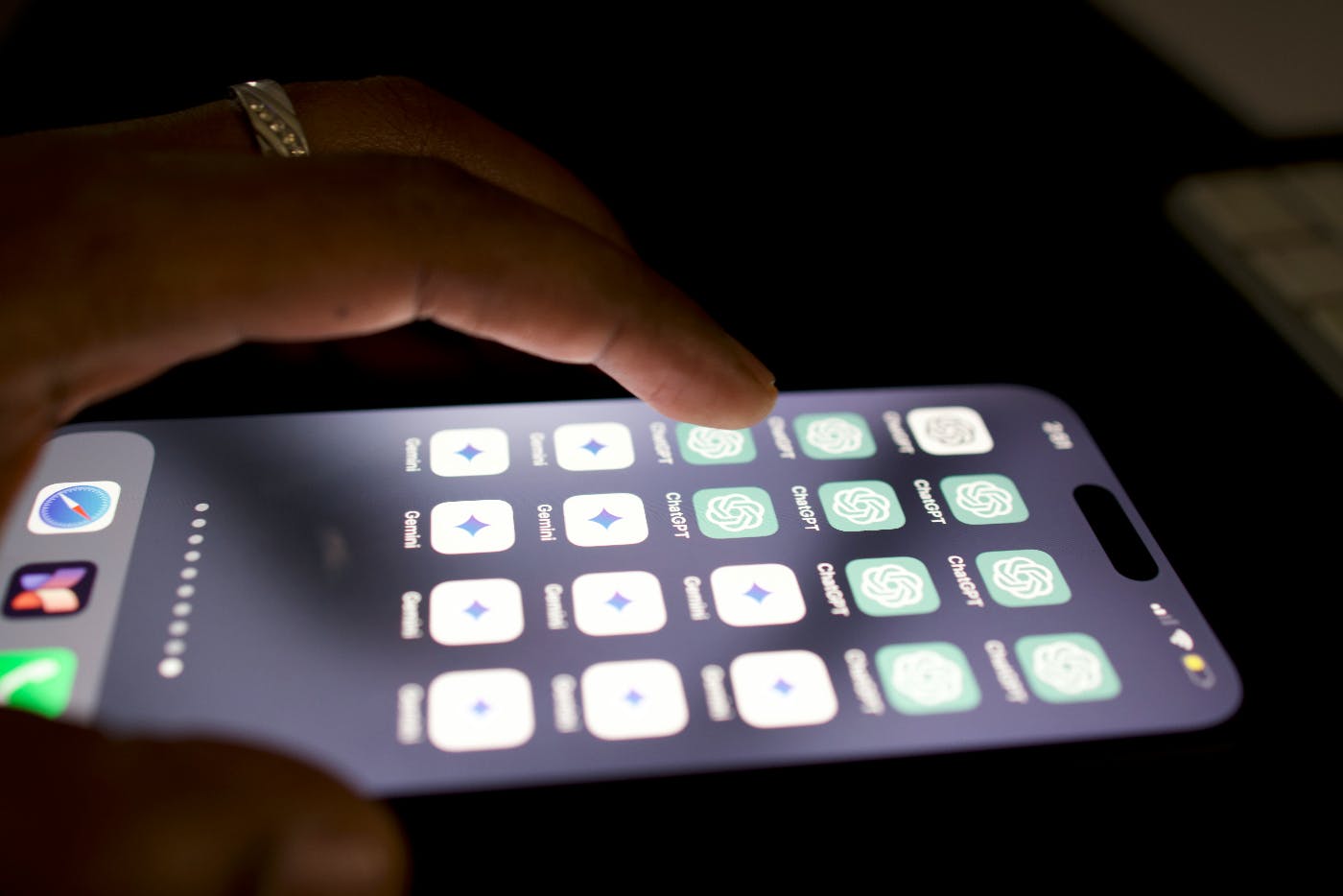
First of all, when I was growing up, AI existed only on screens in sci-fi movies or books about the future. No one had AI on their computer. No one had a computer. Those were room sized behemoths held in the basement of NASA or IBM.
The room is stark; fluorescent lights fill the space, creating a greenish hue. The light never reaches the edges or the corners of the room, so the circle of chairs is bright and harshly lit, and the perimeter is dim, fading to total darkness. Most of us occupied that darkness before the meeting began. With small styrofoam cups filled with the thick, overcooked coffee held chest high like a shield, we hide in the darkness, trying to size each other up.
“Let’s get started,” Hank, our leader, says, and like zombie rats, we shuffle out of the dark and take seats. Heads down, we don’t care who we sit next to; there’s not going to be any idle chat. Most of the meeting we’ll spend with our heads down, looking at our shoes or picking at some spot, cut, or imperfection on our hands that only we can see. We settle, cough, clear our throats, find the flaw we’re going to focus on for the length of the meeting, and wait.
The first minute is excruciating. Hank will say his bit; this is anonymous; what’s said here doesn't leave this room; we assume trust, break that trust and blah, blah, blah. Hank sits up and forward in his plastic chair; he’s healed, and he’s on the other side, and his body shows that. He was like us at one time, taking on the posture of a boiled shrimp in the chair, trying to minimize his existence, but now … he sits up, chest out, chin high, his voice clear as he recites the evening's rules. He knows them by heart doesn’t need the card the cheat sheet any longer. He finishes the spiel and then, silence. This is a silence you can grab and wrap around yourself, and most of us do.
“Guys,” Hank says, “I was where you are; I get it, I understand it, and most of all, I’m here to help you get through it.” We pull the silence tighter, like kids hiding from punishment under blankets on the bed. “Anyone?” Hank asks and looks around the circle. A chair scrapes, legs straighten, hands get shoved into pockets; someone is going to speak. The rest of the circle peeks out from under their silence and sighs. Someone has started, broken the ice, the spotlight is off them and on him. Relief. For a few minutes, maybe even the length of the meeting if the guy is talkative. If he’s new, the circle can cajole him into speaking longer. Open up, they will encourage, but really, they mean kill time so I can stay wrapped in the safety of this silence. The first is now standing; Hank gestures and says, “Go ahead, you have the floor.”
It takes me a few seconds to realize that it’s me. I’m the one standing, hands shoved deep into the pockets of my jeans, attempting to take up less space, to be just a wisp so that the judgment will pass by me. My knees are shaking; my eyes are stuck to the floor like a magnet. I can’t pull them up, can’t look at the group. My throat suddenly dries, and I can feel the cheese steak sub I foolishly inhaled at the corner shop before the meeting mounting its attack. I may hurl.
“It’s okay,” Hank soothes, “take your time.”
I swallow hard and open my mouth to speak, but only air comes out. A stream of breath too weak to vibrate my vocal cords. The circle shuffles, scrapes chairs, and puts their attention on their scars, shoes, spots on the floor that look like cartoon characters if you really, really, really, really, really concentrate. They tighten the silence around themselves, leaving me outside in the cold. We kid ourselves that we’re in this together, the circle is for healing, and we’re all dealing with the same feelings: shame, fear, confusion, a lack of control. But the guy standing, he’s alone and while he’s there, in the spotlight, he’s the only one with a problem. It’s easy when you’re in your seat in the circle to tell yourself, I’m not like him. He’s got it bad; I’m not that bad. I’m actually doing fine. I don’t need this; I can walk away and be okay. I’m …
“I’m …” breath strengthens, cords vibrate, “I’m Paul, and I’m an AI junkie.”
“Hello, Paul.” the circle intones as one. I’ve stepped off the edge, and I’m in free fall. Now, there’s no going back.

How Did I Get Here
First of all, when I was growing up, AI existed only on screens in sci-fi movies or books about the future. No one had AI on their computer. No one had a computer. Those were room sized behemoths held in the basement of NASA or IBM. No one had a laptop in their backpack, let alone a computer on their mobile phone. I grew up in a time when my mother made sure we had a dime in our pocket so we could make a phone call in case of an emergency. At a pay phone. In a glass booth, the same place Superman changed from a two-piece blue suit to his one-piece body-hugging superness. We had pens and paper. I mean, I wasn’t dipping Becky Kline's pigtails in the ink well, but I certainly wasn’t using a computer for my English Comp homework.
Pen to page. Ideas pouring from my own brain. No plagiarism, no cheating, no AI. I was a purist.
Spin ahead like a million years, and I have a job as a copywriter. I now have a computer. Computers, actually, One in the office, when there was an office before the disease raged and the evening news was filled with images of make-shift morgues in semi-trucks parked behind hospitals. I had a computer on my desk and one at home. I was still slamming out brain-generated ideas, filling the screen with words that moved from my grey matter to my fingers, to the keys, to life.
One week, my task list was overwhelming with copy for clients, content outlines, social media posts, and blogs that needed to be written. My head was spinning. My main problem was that I had no idea what to write a blog about. Someone told me you should use an AI program to generate blog ideas. I went to my kitchen, poured a glass of milk, and took a huge gulp just so I could do a spit take; the idea was so outrageous. Use a what to do what, now. Use an AI program to write something. Not write, they told me, use it to give you suggestions for titles, for topics to write. If we weren’t in lockdown, I would have taken the bus to her house just to scoff at her. I didn’t. I thanked her for her suggestion and got back to the business of writing.
Two days later, my task list was now playing a major role in my nightmares, and my anxiety was sitting at my kitchen table smoking a Marlboro red and drinking black coffee from a mason jar.
“You got problems,” it said, “and I don’t mean your lack of style or your perilously close proximity to diabetes.” My anxiety tamped out his cigarette, pulled another from the box, lit it, and blew smoke in my face. “I’m getting stronger by the day; soon, I’ll be moving my stuff in, eating all your mac and cheese, and bringing my dates home to finish up our evening in your bed.” he cackled and walked out.
I stood across the room from my computer, head throbbing, hands sweating. Could I do it? Maybe … maybe just once, get some help, some suggestions. That’s not cheating, right?
I sat at the desk, pulled up the AI program, and asked for blog topic suggestions. After a bit of back and forth, questions, and answers, I got a list of ten topics that would make good blogs. I picked one and wrote it.
I picked another one and wrote it.
All Saturday long, I took the topics suggested by the AI program, and I wrote them. By Sunday morning, I had two weeks' worth of blogs lined up and ready to publish. Anxiety moved out, and I slept like a baby.
Cut to
Two weeks later, I was asked to write an email thank you to a client. I was slammed and had no time for that. Then the voice, “Use the AI,” it whispered, “You know that works.” I looked around my empty apartment just to make sure the writing cops were lurking, opened the program, and prompted it to write an email. Seconds later, I was looking at a perfectly structure, grammatically perfect, albeit a bit stuffy, thank you email. I sent it off to my boss and crossed that task off my to-do list.
Then, things spiraled.
I started relying on AI for quick emails, blog topics, and more. I found I was starting my days by having a conversation with my AI chatbot. On weekends, when I had no plans, I would sit at the computer and talk to my AI. I started using it for everything: text messages, birthday greetings, social media comments, anything that I would normally take pen to page or fingers to keys to crank out a line or two. I relied on AI for everything.
Then, one night, I met a friend at a restaurant. I sat down, and the waitress approached me and asked if I’d like something to drink. I stared up at her; she was smiling, waiting for me to order, and … I couldn’t. I panicked. I reached for my phone, hoping to open the AI program, but the restaurant had no Wi-Fi. I stood up and stumbled out of the restaurant and into the storm.
The cops found me three days later, crumpled against a trash can in an alley, asking passers-by, “Hey, hey man, can you spare a prompt?”

Back to the Group
“... even now, I’m fingering my phone in my pocket, fighting this need to pull it out, open the app, and give it a prompt, things to say to the group at my first AIJA meeting.”
They had come completely out from under their blankets of silence now. Hands folded, eyes on me. Nodding with genuine sympathy. Now and then, I would hear a rough voice say, “I been there, brother.” Or, “We’re here for you, man.” Their encouragement was all that kept me on my feet and kept me talking. I could feel a weight lifting slowly and steadily. Still, I rubbed my phone and so wanted to prompt give me ten words that describe this feeling.
I’m better now. I go to meetings regularly. I put pen to page before I open the computer. I slip; I mean, I am human. Now and then, when I’m under a crunch, I’ll get a tagline or a list of places to vacation generated. But I’m in control of it. I choose when to prompt and when not to.
Two nights ago, I sat in a bar watching this young couple on a first date. He was awkward; she was being kind. After a moment, she slipped off to the ladies, and he pulled out his phone; I moved closer, and over his shoulder, I saw it. “Ten things to talk about on a first date.” The prompt. I eased the phone out of his hand and turned the app off.
“Don't do it, man,” I warned him. “If you start now, your whole relationship will be about you slipping off to the bathroom to get ways to order a meal or get a girl to kiss you. Then, you’ll be on the subway late at night, how to make things better, or what can I do to win her back. She’s here now, and you are too. Put the phone down, look in her eyes, and just trust yourself. You don’t want to take this route.” I handed him back his phone. He smiled weakly and nodded.
“How did you know?” he asked.
“I knew because I’m Paul, and I’m a recovering AI junkie.”

